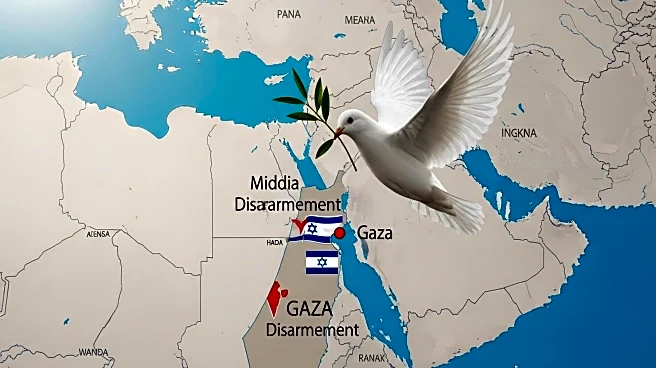What is the story about?
What's Happening?
Senior U.S. officials have announced that forces from Egypt, Qatar, and Turkey will collaborate with the U.S. Central Command and Israel to oversee the disarming of Hamas in Gaza. This decision comes as part of a broader cease-fire agreement, with the United States opting not to deploy its forces directly into the enclave. Instead, the U.S. will assist in managing the situation from abroad, focusing on diplomatic and logistical support. The involvement of regional powers is seen as a strategic move to stabilize the area and ensure the cease-fire holds, while minimizing direct U.S. military involvement.
Why It's Important?
The decision to involve regional powers in disarming Hamas reflects a shift in U.S. foreign policy, emphasizing regional collaboration over direct intervention. This approach could lead to a more sustainable peace process by empowering local stakeholders and reducing the risk of escalating tensions with direct U.S. military presence. The move also highlights the U.S.'s strategic interest in maintaining stability in the Middle East while managing its military commitments globally. For the U.S., this could mean a reduction in military expenditure and a focus on diplomatic solutions, potentially influencing future policy decisions in other conflict zones.
What's Next?
As the cease-fire takes effect, the focus will be on the successful implementation of the disarmament process. Regional powers, along with Israel and the U.S., will need to coordinate closely to ensure compliance and address any violations swiftly. The success of this initiative could set a precedent for future conflict resolution strategies in the region, potentially influencing U.S. foreign policy and its approach to international peacekeeping efforts.
Beyond the Headlines
The involvement of regional powers in Gaza could lead to a shift in the balance of power in the Middle East, with countries like Qatar, Egypt, and Turkey gaining more influence in regional security matters. This could alter existing alliances and affect the geopolitical landscape, with implications for U.S. relations with these countries and their neighbors.
















